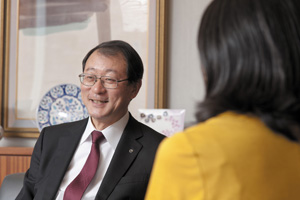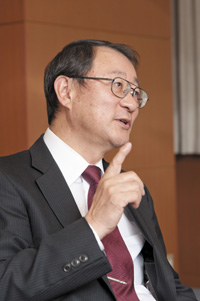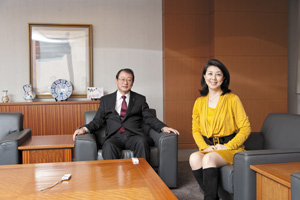The key to healthy sales and profits is
helping to create and design a
new communication culture and lifestyle
—Mr. Murao, it’s been about half a year since you became president of NTT WEST. Do you feel that you have settled into your new position? Please tell us about your aspirations and growth strategies looking forward.
At the time of my appointment, I was overflowing with ideas, and all I could think about was ways of implementing them. But on assuming this office, I didn’t have nearly as much time for detailed and thorough strategic planning that I thought I’d have. Nevertheless, I want NTT WEST to become a “culture-creation company,” and I would like all of us in the NTT WEST Group to bring a lot of spirit and energy to our work in line with this corporate direction.
Let me be more specific. First, in the face of decreasing revenues in voice-related services and increasing revenues in Internet protocol (IP)-related services, I plan to do everything in my power to eliminate this revenue gap between two business areas that are said to be uncomplementary. I will also promote service development and the creation of alliance-type services based on a mindset that places importance on improving our customers’ lifestyles. This is how I plan to establish a stable financial foundation for NTT WEST.
On the whole, there are about 16 million subscribers to telephone services and about 7 million subscribers to optical—or HIKARI—broadband services at NTT WEST. If we can raise the average revenue per user by providing additional optical fiber services, we may be able to increase revenues by 20–30 billion yen. In this way, I would like to close the revenue gap that I just mentioned at an early date and increase our overall revenues.
At present, the longtime growth in optical broadband services is starting to slow down as mobile services using smartphones, tablets and other mobile devices continue to spread. Under these conditions, I would like to position Wi-Fi as a bridge between optical and mobile services and to aggressively develop services that make use of Wi-Fi.
Of course, we will also be focusing our efforts on cloud-related businesses. We have set up a development and strategy-planning system for cloud businesses and have expanded our support staff to 500 employees. By doing so, we hope to change our traditional corporate business style to a sales style centered on the cloud.
As we look forward, we will make an all-out effort to create new services. In this endeavor, it is important that we design new services from the viewpoint of customer lifestyle.

Moving from self-sufficiency to
maximum use of alliances
—Please tell us something about alliance-type businesses.
While I would like to see all NTT WEST employees working together on projects for developing new optical fiber services, I would also like to see us becoming even more active in the development of alliance-type businesses as part of this effort. Instead of adhering to an extreme belief in self-sufficiency, we need to consider that forming alliances with companies possessing world-class technologies, extensive know-how, and advanced networks can lead to prompt creation of novel services that can help create a new communication culture and lifestyle.
To this end, we have established an alliance promotion office and have set out to form alliances focused mainly on video services such as Smart TV. Perhaps the announcement of our recent partnership with Hulu, the online video delivery service, is still fresh in your minds. From here on, I plan to form various alliances in order to make compelling services like Smart TV a reality.
We have also set up a business-design promotion office and a cloud business department. Our aim here is to create highly novel businesses. We want to design and implement models for unconventional, progressive businesses and services without being restricted to telecommunication services by collaborating with business operators in a variety of fields.
For example, we have established a company called NTT SMILE ENERGY together with OMRON Corporation to provide energy-saving support services for households. These services include providing users with the technology to visualize their energy savings and electric power usage and generation. We have also begun to develop cloud services for health management in collaboration with hospitals and public welfare services together with local governments. Additionally, we have partnered with Yamaha Corporation to provide a service that enables musicians in different locations to perform together using Hikari Denwa, our optical-fiber IP phone service, without feeling a delay. If we tried to develop novel services like these entirely on our own, I don’t think we’d be able to create a new communication culture.
In the beginning, I think our employees were somewhat at a loss as to how to go about forming such alliances, but now, they are quite happy to hop around the country looking for strategic partners.
Up to now, we have been involved with a variety of undertakings centered on the construction of the Next Generation Network. However, focusing only on the network will not enable us to keep up with the times. In the end, it is essential that we change our way of thinking and take up projects in tune with the aspirations of our customers and alliance partners if we are to be accepted by society as a viable player.
In addition, statistics show that mobile phones are more likely to be used indoors, inside the home. With this in mind, we are providing a service called “Sumaho De Hikari Denwa” that enables a smartphone to be used as an extension of the Hikari Denwa service in the home, thereby drastically reducing calling charges. This service was made possible by an application that was developed by a small venture company in Kyoto that had been working out of a small apartment in a condominium building. We have been able to form alliances with such companies and provide services that please our customers, but it is not easy to determine exactly where such chances lie. For this reason, it is important for us to venture out beyond the confines of the company and work up a sweat, so to speak, visiting customer sites to keep us wired into the needs of society. We must change our behavior patterns, and that includes me as well.
Clients are great business partners
We have found our customers to be great business partners. It is my desire to treat our customers as highly valued clients, and at the same time, to become a valuable business partner to our customers. I want to establish new and exciting businesses that combine the strengths of our customers with our advanced ICT (information and communications technology) platform.
To this end, I would like to see our sales staff—which has many opportunities to interact with our customers—serve as “troops” on the lookout for business opportunities that we call “seeds.” My plan is to set up, by summer, a department in each region of the country to search out opportunities to form alliances. You can expect these troops to promote alliance-type businesses not just from the viewpoint of selling something but also with the goal of discovering the seeds of future business.
Responding to difficult times in an attack pose with spirit and joy
—Market conditions for the entire industry are considered to be very severe. How do you confront this battle for market share?
In my mind, we must always keep up the attack in the market share battle with a firm resolution to succeed; losing is not an option. We are continuing to move forward in this battle, but the management environment and the broadband industry are undergoing tremendous changes. If we fail to realize that optical fiber is not the center of broadband services, we will truly be left behind. Players from around the world with a focus on smartphones and other mobile devices are entering network-related businesses bringing about drastic changes at an unimaginable speed.
Despite these changes, there are companies that are happily moving forward and achieving good results. It is not a good thing that the company managers use the word “severe.” It can be said that the so-called “severe” conditions are simply a call for spirited action—it will not help to simply give up and become complacent about those conditions.
In other words, because the changes are as dramatic as those that occurred during the Meiji Restoration, it is exactly during turbulent times like these that we should be excited about moving forward and taking up the challenge of building a better world. From a global viewpoint, NTT WEST is just another enterprise among many, but I believe that being conscious of where we stand and taking necessary measures can put us on the path to success.
During my 30s and 40s, I had the good fortune to work under some senior personnel with strong personalities who trained me well. Learning from them, I became convinced during my years as a branch general manager that “seeds are found in the field, at the front line.” This is why I always made the rounds of local sites by myself. If I were to make these rounds with a retinue of assistants, those sites would be informed beforehand of my visit and would “clean up” accordingly, preventing me from seeing how they operated on an everyday basis. At first, employees complained that they could not “emotionally prepare” for my visit, but they gradually became accustomed to my impromptu appearances and to talking to me about work conditions and problem areas. The true state of conditions in the field holds abundant ideas for improving business.
This approach holds true for corporate business too. In analyzing the frequent occurrence of certain types of problems, I found that personnel in charge would often keep the problems to themselves and fail to consult with their superior. No doubt they thought that openness in the workplace was not such a good idea and feared a reprimand from their superior. To improve this situation, I told those holding positions of responsibility that “The worse the news is, the sooner it should be reported. Good news can be summarized later, say in written reports.” I could then take action in dealing with such problems and even go out to the site in question.
Consequently, as a branch manager, I was often asked to travel to sites to partake with personnel in negotiations with customers, and this sometimes meant driving more than 100 kilometers in one day. Through those experiences, I couldn’t help but find the work to be interesting and enjoyable”.
I still follow this management style taught to me by my superiors. I consider it to be my roots.

Intuition, decision, and heart
—Mr. Murao, can you leave us with a few words for NTT WEST employees?
My personal motto, which I learned from the president of a certain bank during my days as a branch manager, is “intuition, decision, and heart.” This is short for “exercising your intuition, making a decision, and unifying the hearts of the people under you.” A top executive must be able to make projections about the near future and to read “forward-looking vectors,” and to then make decisions as a matter of responsibility. Most competent executives possess these qualities. The most important quality of all, however, is being able to unify the hearts and minds of the company’s employees. Failure to do so can lead to accusations of “power harassment” and a reputation as a dictator. To be sure, this is not an easy task, but if a manager is not up to it, there is no way of moving the organization forward.
To this end, I use an “indirect circuit,” in which I make an effort to study reports not just from sections in charge of key areas but from other sections as well. I believe that I can spot things from a slightly indirect view that I would not notice from a point within the “whirlpool” of activity. I place a great deal of importance on this approach, which leads to various opportunities for having detailed talks with employees.
And here, I mean all employees. There is no reason to give the executive staff special attention—they are also “colleagues” to one and all within the company.
If I were to be revered with calls of “President!” and paraded around like a mikoshi or portable shrine on the shoulders of others, the end would certainly be in sight for me. There are no “distinguished” personnel at NTT WEST as far as I’m concerned. To everyone, I say, “Let’s move forward as one.”
—And finally, can you leave a message for NTT researchers?
As a researcher, there are fields that one would like to pursue and make achievements in. But from a business point of view, it’s important that such research desires be skillfully matched up with management goals. Failure to achieve such a match can only lead to misunderstandings. I’m not saying that we have so far not been achieving mutual understanding, but I would like to create an atmosphere that makes it even easier to understand each other’s needs and to convey one’s true feelings so that we can exchange opinions more effectively. To facilitate intensive discussions, the topics should be narrowed down, and honest, in-depth debates should be pursued. Discussions of this type can help us move forward with a sense of urgency completely in line with the company’s direction.


